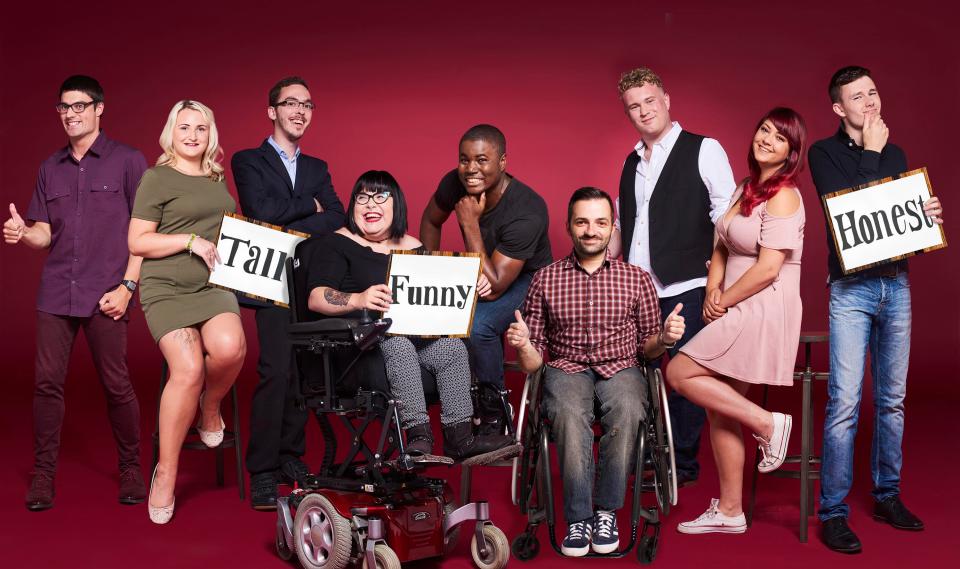BAFTA nominated TV programme ‘The Undateables’, which follows a different group of disabled singletons each week on their journey for love, has returned to Channel 4 for its seventh series. The popular reality show has been on our screens for five years now, yet still continues to evoke plenty of negative criticism and backlash surrounding its content and the way it is presented. The Gryphon discusses popular TV show ‘The Undateables’, debating whether it causes more harm than good.
Critics say that whilst the show succeeds in raising awareness of the difficulties that people with mental and physical disabilities face in love, it does so in a way that is more concerned with entertainment than confronting societal prejudices. However, is this retaliation justified? Do the public view it as merely a form of entertainment, or is it altering people’s views on a consistently marginalised group of people?
The name itself is the element which tends to bring about most controversy. Channel 4 bosses claim that by using the word “Undateables” they are referring to society’s preconceptions of the disabled, which they then break down throughout each episode by proving that the people depicted can love just like the rest of us. A cleverly subtle hint to this is shown in the title sequence where Cupid’s arrow knocks down the “Un” in “Undateables”.
“Many of the problems boil down to low confidence, something that is not only universal but also possible to overcome, regardless of society’s high standards.”
Nevertheless, the continuous uproar suggests that this may be too subtle. By not making this challenge to society’s views clear enough, it can be argued that the programme advocates and reinforces the view that people with disabilities are not deserving of love and intimacy; that they are “undateable”. This can only be supported by the fact that producers made the choice not to include something along the lines of inverted commas around this particular word, which would have given extra clarification. Not only does this make the show seem more controversial on the whole, which no doubt consistently pulls viewers in, but it also implies that entertainment purposes have a higher importance than their impact on society’s already tainted view of disabled people.
 Despite debates around the harmful nature of the name, each and every episode illustrates that careful thought is put into handling the show’s sensitive subject. Each individual is given plenty of space to talk about themselves, their hopes for the future, and why they tend to find the world of dating so difficult to manoeuvre as people with disabilities. The dating agencies used throughout the seven series, such as Stars in the Sky, are run by passionate individuals who really care about the happiness of their applicants, often interviewing them personally to find the best matches possible.
Despite debates around the harmful nature of the name, each and every episode illustrates that careful thought is put into handling the show’s sensitive subject. Each individual is given plenty of space to talk about themselves, their hopes for the future, and why they tend to find the world of dating so difficult to manoeuvre as people with disabilities. The dating agencies used throughout the seven series, such as Stars in the Sky, are run by passionate individuals who really care about the happiness of their applicants, often interviewing them personally to find the best matches possible.
The delicate yet very real nature of the show is what seems to grip audiences, as we follow each individual through highs and lows, making us go through a rollercoaster of emotions in just one episode. In this sense the programme gives a touching insight into the everyday trials and tribulations that come with having a disability, forcing us to break down initial preconceptions that these people are worlds apart from us.
“Do the public view it as merely a form of entertainment, or is it altering people’s views on a consistently marginalised group of people?”
However, when we delve further into people’s views on the show, representatives of the British Medical Association describe the series as “exploitative” of the individuals involved. They question whether or not someone with a learning difficulty is able to give “truly informed consent” in the process of becoming a reality TV star. Dr Rachael Pickering also points out that it brings out a “part of a society that might seek to view disabled people as a source of comedy.” This is quite possible due to the use of the often patronising voice-over and music to highlight ‘funny’ or ‘awkward’ moments. Furthermore, we only need to scroll through our Facebook feeds after an episode has aired to provide ourselves with plenty of evidence of this in the way of memes and edited videos.
All in all ‘The Undateables’ succeeds in demonstrating to its audience the way in which people with physical or mental disabilities are often struggling with the same issues as everyone else when it comes to love. It proves that many of the problems boil down to low confidence, something that is not only universal but also possible to overcome, regardless of society’s high standards.
Nonetheless, it still seems the case that the programme depicts a conflict between name and content. This creates the worry that, despite how much each individual challenges society’s preconceptions
of disability, the label “undateable” will remain the very thing separating ‘them’ from ‘us’, thus suggesting the show may fail to have any real positive effect on this part of society after all.
Sadie Scheuer
[Images: Disability Horizons, The Sun]

